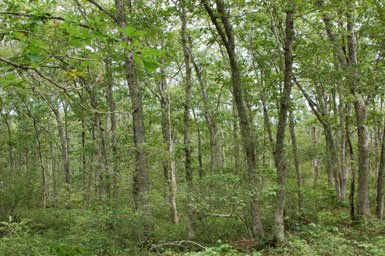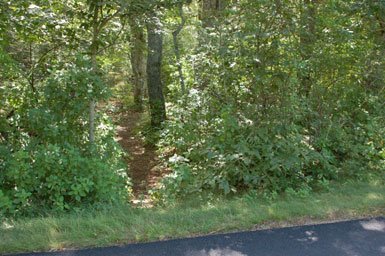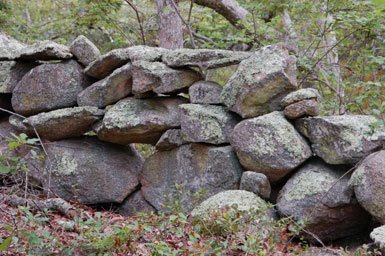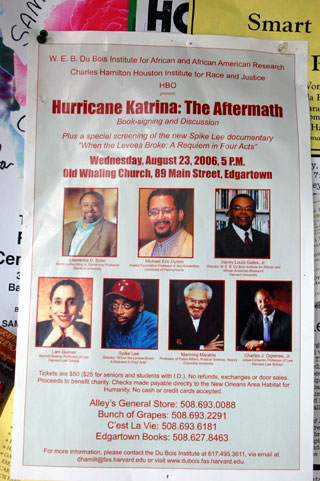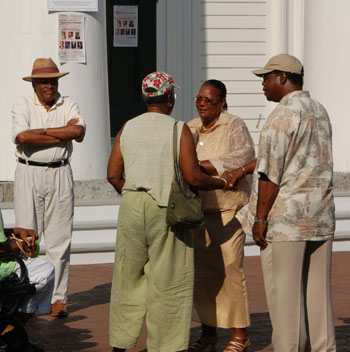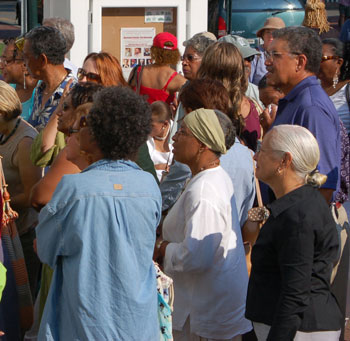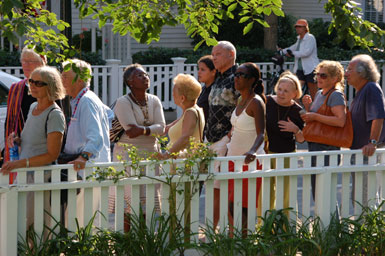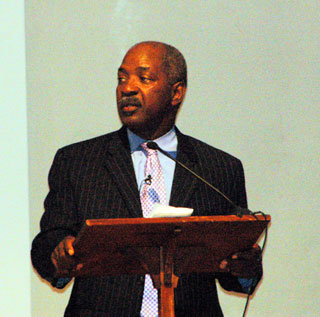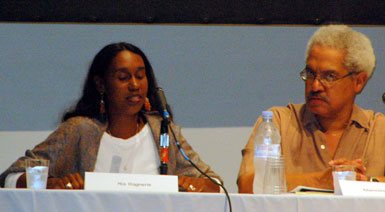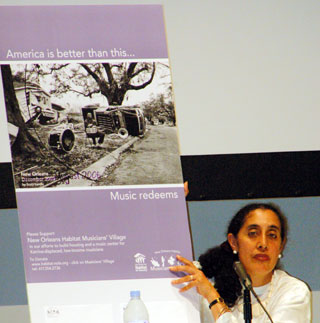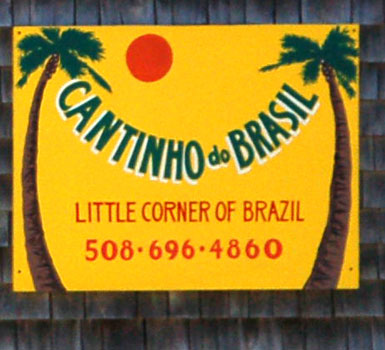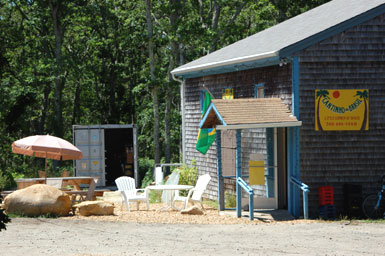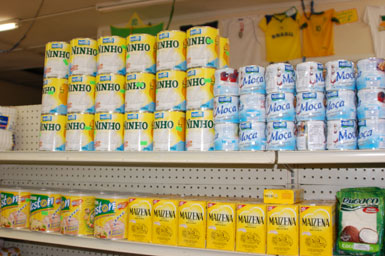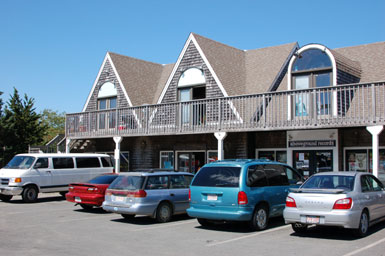 A worker sprays disinfectant, to prevent diseases, at the rubble of buildings that were destroyed during the 34-day long Hezbollah-Israel war, in the southern suburb of Beirut, Lebanon, Monday, Aug. 28, 2006. (AP Photo/Mahmoud Tawil)
A worker sprays disinfectant, to prevent diseases, at the rubble of buildings that were destroyed during the 34-day long Hezbollah-Israel war, in the southern suburb of Beirut, Lebanon, Monday, Aug. 28, 2006. (AP Photo/Mahmoud Tawil) Tina Naccache wrote:
...So I went to movies. And to a meeting. And one Tai-Chi class. And most of all fell apart.
I had been so tired that I felt it in every bone and couldn't keep my eyes open in the evening. But also couldn't really sleep. So on Friday, I drank coffee. And then set myself to straighten up papers. It took two days work and mounds of paper thrown into the garbage; I have ended up with seven binders straightened up.
I read a short piece in a newspaper; then I understood why I was doing it. The writer talked about how people who had left their homes and returned to find them either standing or hit or flattened felt that the war was over. The returnees were feeling it. The people of Beirut who just heard it all and stayed in their homes were feeling kind of lost because the war for them was not over. And this is why Beirut is still unable to go back to life.
After reading this, I understood that my cleaning up the folders was my way of turning a new page, of bringing the war to closure. So yesterday I wanted to go to the southern suburb, to check on my friend Luqman's house. I knew it had been hit.
We drove near the main entrance of Shatila and headed straight. It was strange not to see the bridge. The airport's bridge is just cut. Very strange sight. Luqman's house is partly hit. Not badly by the standard of what was to be seen. But badly by any other standard.
We drove inside some of the wider streets. I didn't want to see it all, just to have a feeling. Very quickly tears came up to my eyes at the sight of mounds of rubble. Here and there, between buildings there is a mound. Tall buildings flattened with few marks from shrapnel hitting the surrounding buildings. Just the blast effect on the windows and outside curtains (the ones on the balconies) and the inside. But no holes cut by shrapnel. I know of about shrapnel; parts of my apartment are marked by shrapnel gouges from the civil war. They have become part of the walls and the surroundings.
Stuck in a street narrowed by rubble, I had time to look around at the piles of debris that were just outside the car window. I saw a computer keyboard that had lost only its space bar. As I type this, tears come up again. Our lives are in a keyboard. Mine, yours. People like you and me lost everything. Even the backups must have been lost.
And not because of Mother Nature. And not because of a virus. Just because of the arrogance and hatred and stupidity and foolishness of humans, men and women. The pilots should be taken to an international court. War criminals.
It was Sunday and the machinery was silent. But I saw some men near a building with paper masks covering their nose and mouth. They looked like professionals assessing the work to be done. I could see a mattress salvaged on the side of the street. Who will sleep on it with all the dust and the burning smells? Indeed on some streets I could smell the same burning smell that the wind carried to my apartment during the bombing.
When we drove away from the area, Albert said: "What is terrible is to see how gratuitous was this bombing." We were already at the beginning of the
Green Line of the preceding wars. We passed a building that has a tire shop at street level while the two floors above were destroyed some decades ago and were never rebuilt. The walls were pocked. Plants growing inside some holes here and there. An old beaten up building that had seen fighting. A totally different sight from what we had just seen. No flattening. Marks of fighting. One could imagine the men shooting at the building with different kinds of weapons. Obviously the inhabitants would have run away as happened on my parents' street.
The destruction of this recent war doesn't seem human made. It feels as if the bombs were dropped by demi-gods, flying the skies with no human challenge. Pilots believing themselves to be Haddad, the Zeus of this part of the world. Stupid men. Criminals. A friend told me today that another friend went to the suburbs to check on her house. She was with her husband. They started arguing about which mound was their home. Several buildings had collapsed and the view of the rubbles confused them. Flattened buildings. Flattened homes. Flattened as if someone had pushed with a mighty hand and all became a pile of concrete. Nothing to be salvaged.
We drove down the entire Green Line starting from the flattened southern suburbs. Layers of wars. Leftovers of wars. When we passed the public garden behind the racetrack on the other side of the museum, the pine trees were alive and well. This part of the garden is not open to the public yet. The city of Paris and its suburbs financed the replanting of the area. The garden is called "Hersh," the word for forest in Arabic. It had been planted by the Amir Fakhreddine, 250 years ago. Israeli pilots had burned it in 1982. This is not the first time they flatten and burn in my city.
We went down to
the Corniche [Beirut's famous seaside promenade]. The Corniche was full of people. Some with covered heads and some with beautiful hair. Children of all ages. Families. Mothers. Young men smoking water pipes seated on plastic chairs. Bicycles that were a real nuisance. Roller skaters. Gay men in the spot they always pick at night. Some people were fishing although the sea has not recovered yet and the oil is covering the rocks in the bottom. I walked enjoying the scenery. People were alive. The sun was setting with no drama.
It came to me that Beirut had a strange power. People kept coming to visit and many loved it and were taken by its charm, while we had still scars of fighting that happened 30 years ago. A special city I guess.
When I made it home I listened to Sayyed Hasan Nasrallah while embroidering. He is such a great orator and such a great speaker. He was interviewed by a woman. Her questions were good, they allowed him to express himself. His answers were exciting to listen to. I made an indent in the embroidery. I felt I was coming back to life.
When Lebanon is not under attack, Tina Naccache works for the rights of domestic workers and makes films.












